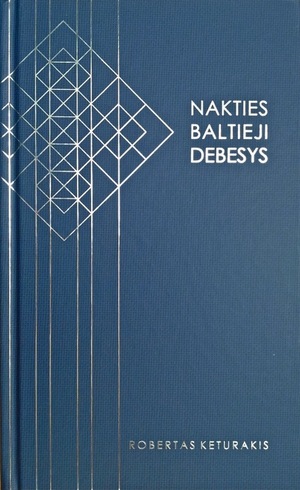Ask yourself what you are looking for 3
In brief: After glancing at the dark cover of the latest Robertas Keturakis' collection of poems Night's White Clouds (Nakties baltieji debesys. Kaunas: Pasaulio lietuvių kultūros, mokslo ir švietimo centras, 2016.), on which artist Daiva Šulgaitė drew cosmic (or maybe ethnic?) signs with simple, silver-colored patterns, luminous in the dark blue background, the title might seem a bit gloomy. Let's not be fooled: light clouds are floating in the black night's sky and not everyone is able to see them. Poet poses a challenge - to be able to see the light in the dark of night.
The more open to thought each work of art is, the fuller it is. "Learn to enjoy the unfinished thought - let it travel where it wants," says the poet in the poem "While the skies are open." The work written in a witty style carries a Shakespearean paradox: a thought is disobedient of life and death, it thrusts towards freedom, alive, as long as the skies are open. Closed it collapses; lifeless it freezes. A thought, just like a bird needs space and freedom.
To what reader these poems are dedicated to? Most likely, primarily, to oneself. From the desire to walk down the father's cherry grove in memories, to return to the village that no one remembers anymore, to walk the little path that has no name. And the stone near the threshold that does not exist anymore, and to silently and manly mourn the Campion inside and leave it to be able to say, "There is no unlived time, there is only a patient longing of Eternity," to leave for "where I am expected - not bearing the seduction of temporality..."
The book is finished with the poem "To Sūduva." Poet's birthplace is portrayed through a personified image (barefoot, with cut hair and mysterious patterns on the apron); its fate remains relevant as in the previous collections of poems. The modest and gentle sighs are dedicated to "My Sūduva" as if it was a poets beloved. Sūduva is a part of Lithuania, a symbol of Lithuania itself.

